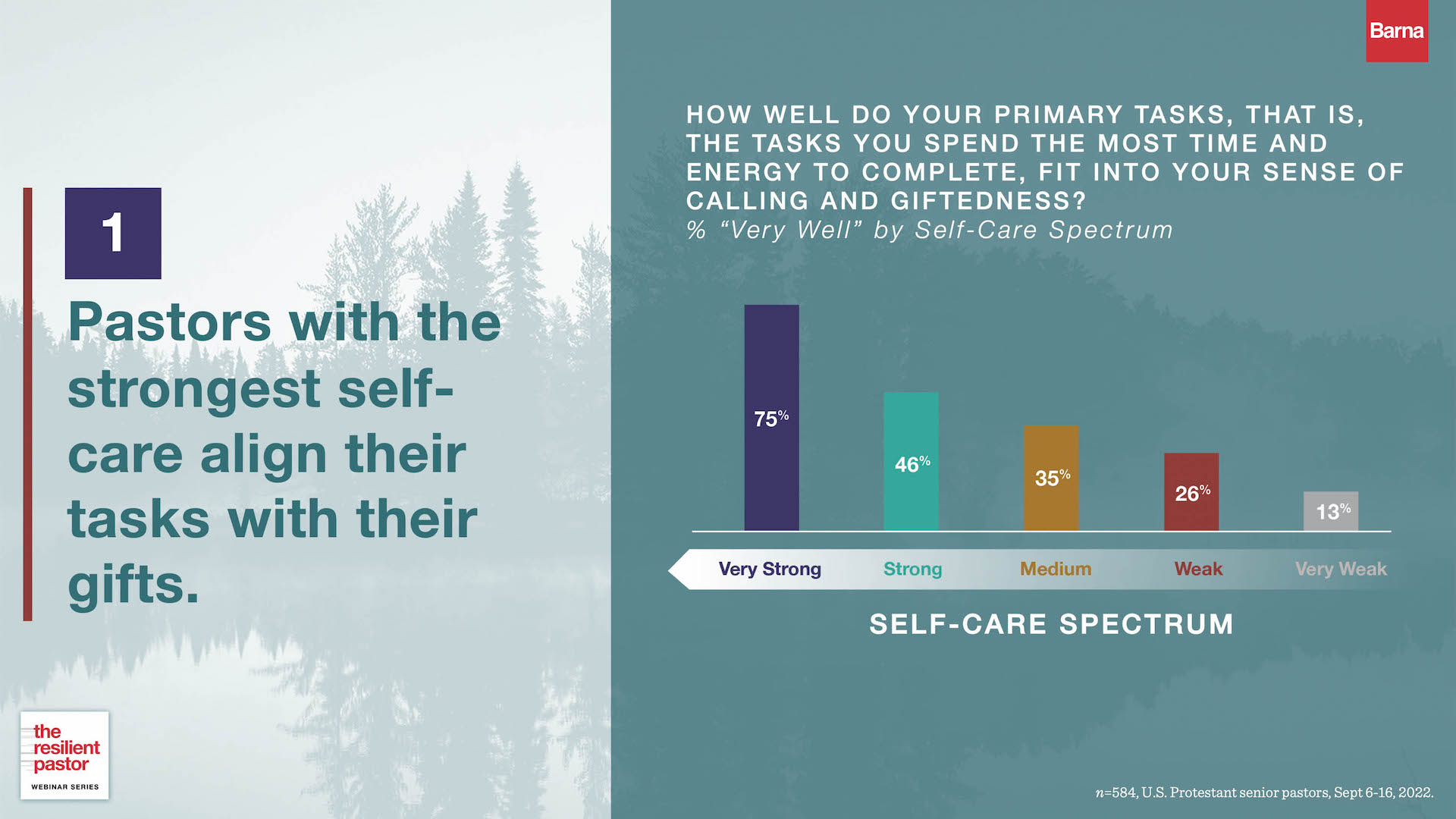
[This article is part 3 in a series where I am interacting with the latest data from Barna on Pastor’s Well-Being. You can read the first Article; Pastoral Well-Being is in Decline]
Characteristic One. Pastors with the strongest self-care and greatest overall satisfaction align their tasks with their gifts.
Over a 7-year period, Barna asked pastors about their well-being and overall satisfaction in ministry.
In that 7-year time period, overall satisfaction numbers have declined in some troubling ways. You can read more about it in my article Pastoral Well-Being is In Decline and Why Your Self-Care Might Not Be Working.
While overall satisfaction has declined, the good news is that we can learn from the thriving pastors to implement practices into our own lives to find more joy and satisfaction in our roles.
How Much Are You Working on Your Area of Giftedness
If you had to give a percentage, how much of your time and energy do you spend working on the areas of your giftedness?
According to the latest data by Barna, they asked Senior Pastors, “How well do your primary tasks, that is, the tasks you spend the most time and energy to complete, fit into your sense of calling and giftedness? “
How would you answer this question?
Your answer to this is important because it directly correlates to your overall satisfaction and the effectiveness of your self-care.
Pastors spending most of their time and energy in their area of giftedness reported the greatest satisfaction.
The opposite is also true. The pastors who spend most of their time in areas outside of their giftedness are going to experience lower levels of satisfaction.
That’s because your area of giftedness is the unique thing God gave you to do.
It is the deeper calling imprinted on you by the creator, and when you are not spending quality time on your gift, it may eventually fade or worse, God may assign your assignment to someone else.
It is clear that there needs to be alignment between your gifts and how you spend your time.
Let me say this again, if you want to experience greater overall satisfaction in your role as a pastor and your life, you need to align your area of giftedness with your best time and energy.
I know this can be difficult if you are a sole pastor without a staff.
I have pastored in churches where I was a staff of one and it felt like I was wearing too many hats, (finance, admin, maintenance, counseling, visitation, etc) to work on my area of giftedness.
It often felt like I was in a never-ending sprint to finish all of the tasks on my to-do list. The worst part about it was that every day felt the same.
When you find yourself in this place, it’s easy to go into automatic mode and do only what needs to be done for the week. Important work as it may be, but nevertheless ignore your gift in the process.
If you find yourself in this situation, I want to encourage you not to give in to good enough.
Primarily because if you settle for good enough, you are not going to be satisfied with your job and that dissatisfaction will lead into other areas of your life.
If you give into good enough, you will find all the excuses you need not to spend time in your unique area of giftedness.
Remember, if God imprinted these gifts into you, the world needs your contribution.
No one wants to spend their life doing just enough to get by.
You were created for an abundant life, not a life of mediocrity!
If this sounds like your situation, there is good news because there are things you can start doing today to feel more satisfied in your work and life.

Things to Start Today
1. Don’t Wait, Start Today.
Starting working on your gift today.
The more you cultivate your gift, the better you will get at it, and the more it will flourish.
So if you like to write, WRITE!
Start small and go from there.
Write a weekly email to your church, start a blog, add a pastors page to your church’s bulletin if you have one, write a book! Whatever it is, start being intentional about incorporating it into your daily and weekly schedule. Whatever it is, painting, making music, or creating videos start small; START TODAY.
Remember, what gets scheduled gets done.
2. Manage Your Energy.
Everyone gets the same 24 hours a day.
Some people get more done than others.
I know I’ve been through seasons in my life when I saw other pastors getting so much done, like writing, creating films, doing photography and I would get mad.
I had a scarcity mindset and I would get jealous.
Neither of those feelings helped me work on my gift.
The trick, I learned, is not so much to manage your time but to manage your energy.
Carey Nieuwhof writes that “Managing your time is one thing. But real progress comes when leaders manage their energy.”
In his book At Your Best, Carey Nieuwhof writes that everyone has a Green Zone. Your Green Zone is when you are at your best.
When your energy is best, do the things you’re best at!
When your energy is best, work on your gift!
Your first step is to define your Green Zone. When are you at your best mentally, physically, and spiritually?
It’s important to remember that everyone is wired differently.
Don’t force your Green Zone where you think it should be, simply be aware of it, and work your schedule around it.
For me, my Green Zone is between the hours of 5 am and 9 am. This is when I am at my best! Not everyone is a morning person. My wife’s Green Zone is between the hours of 9 pm and 12 am. We are all wired differently.
Find your Green Zone and protect it.
3. Get Support from those Closest to You.
If you are married, talk to your spouse about your Green Zone and your desire to work on your area of giftedness. Chances are they already know both of those things and have been waiting on you to move on them!
Get their help in protecting that time.
If you have a family, things can be admittedly harder. Kids introduce a wonderful need to be flexible and creative in how your schedule your day!
Before I had kids, it was easy to protect my mornings.
Now with two young daughters that constantly want my attention, I have had to pivot and change the way I work. I have had to wake up a little earlier to get the undistracted focused time I need.
If you are single, then schedule your Green Zone into your daily schedule! Use this time to get ahead where God has called you to go.
Make the small adjustments daily and see how they add up over time.
4. Bring Your Team on Board.
Work with your staff, key leaders, and elders, and let them know about your giftedness and invite them to support you.
You might be surprised at the support you’ll get from your leaders. I understand that not all churches will be as supportive as others.
But you have a responsibility to keep developing the gifts and passion that God has put in your heart.
The clearer you are about articulating it, the better they will understand it. It helps when your gifts can be seen to minister to the church in some way.
I remember having this conversation with my elder team after being at a church for four years.
I set boundaries during that conversation. I told them that I was at my best between the hours of 5 am and 10 am and that during those hours, my phone would be on Do Not Disturb. They could call and leave a message or text, but I would not be getting back to them unless it was an emergency. They understood and never called be before 10 am. I was there for a total of 9 wonderful years.
Having this conversation with your key leaders takes courage. But on the other side of courage, your deeper calling awaits.
Do you think you can begin today to be intentional about using your gifts?
What the Data Teaches Us about Younger Pastors
The data is clear that pastors who spend the majority of their time and energy on their area of giftedness lead to greater satisfaction.
The more satisfied you are, the more you will give your best.
The data, by the way, shows that the numbers are worse for younger pastors. Pastors under 45 years reported less overall satisfaction than those over 45 years old.
We have a sacred responsibility to help our younger pastors cultivate and grow their gifts.
I understand that in a 40-hour work week, it’s not realistic to spend 30 of those hours on our area of giftedness.
But what keeps us from asking, “What would it look like to be more intentional about creating time and space for our younger pastors to develop their gifts?”
What would it look like to celebrate their contributions?
We need their gifts because the data shows that GEN Z isn’t looking to churches as spiritual authorities with answers to their deeper existential questions.
That’s probably because we have too many Boomers and Gen-Xs in charge, speaking very different cultural languages.
But what if, we empowered our younger pastors to create more, dream more, and experiment more in hopes that we could be spiritual guides to Gen Z and beyond?
When I think of the younger pastors who come into ministry after seminary in their 20’s, too many times we have seen young pastors leave after just several years.
I wonder if part of that reason isn’t because we have not created ways for them to develop their gifts!
It’s clear we have a lot of work ahead of us, but if we believe it’s important, we will rise to the occasion.
